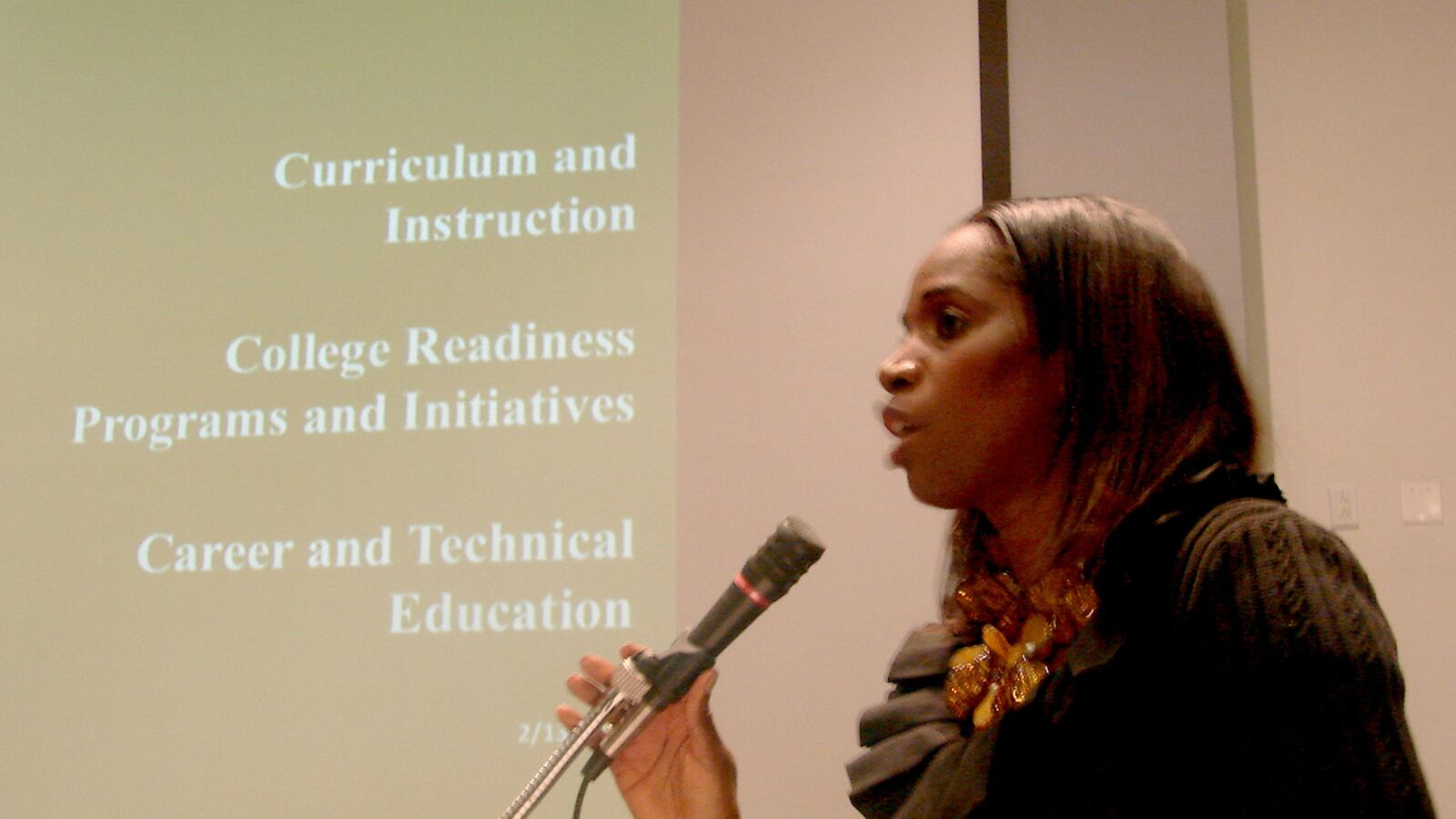This article was originally published in The Notebook. In August 2020, The Notebook became Chalkbeat Philadelphia.
by Benjamin Herold for the Notebook and WHYY/NewsWorks
UPDATED 12:30 a.m.
Centrally mandated scripted curricula will soon be a thing of the past, New Chief Academic Officer Penny Nixon told the School Reform Commission Monday.
“We believe the curriculum should say to teachers, ‘Here’s the what’ and give them the flexibility as to the ‘How,’” said Nixon.
“From the District level, will we say, ‘You have to use this scripted curriculum?’ No.”
Such a change will mark a significant shift in the District’s approach to classroom education. Currently, dozens of low-performing Empowerment Schools are required to follow strict curricular mandates, including use of scripted remedial programs like Corrective Reading and Corrective Math that are anathema to many teachers.
But starting as soon as next year, principals will be given significantly more authority to select their own program materials, and teachers will be given greater flexibility in the classroom, said Nixon.
“We believe that providing schools with more autonomy will give them the opportunity to be more creative in engaging their students,” she said. “If everything isn’t scripted, it allows teachers to bring [their] creativity into the classroom.”
After the meeting, teachers’ union president Jerry Jordan hailed the “great news.”
“Teachers absolutely hated the scripted program,” said Jordan. “This is great for teachers, great for kids, and it will save the District a lot of money.”
The shift could also signal a deeper change in how the District organizes and supports schools.
After the meeting, Nixon was noncommittal as to whether Empowerment Schools would even continue to exist.
“We’re still in the process of reorganizing,” she said. “We haven’t finalized the structure of the schools yet.”
Nixon said the District is looking at “clustering principals in a way where they can support each other around professional learning teams.” A reorganization effort will take place from April to August of this year, after principals and teachers have had the opportunity to give input on the new direction.
“We’re trying to shift the culture of the District,” said Nixon.
The news comes out of the SRC’s "Strategy, Policy and Planning" meeting Monday night. Commissioner Wendell Pritchett, who chairs the SRC’s Postsecondary Success Committee, moderated a two-hour session that featured three presentations from District staff and extensive back-and-forth between the commissioners, District staff, and an audience of roughly 100 people.
During a presentation on “Guiding Principles of Curriculum and Instruction,” Nixon and Deputy Chief of Curriculum, Instruction and Professional Development Darienne Driver focused on the District’s efforts to align its curricula with the forthcoming Common Core standards, a national initiative that Pennsylvania has signed onto.
There will be “changes in expectations of what our students are able to do,” said Driver. She highlighted new emphases on writing and on students’ ability to read informational texts as examples of what will soon change.
District staff also presented on “Accelerated Learning/College Access” and “Career and Technical Education.”
Deputy for Accountability and Educational Technology Fran Newburg talked about the variety of college readiness partnerships the District has in place. She highlighted the work of “Project Mastery,” a Bill and Melinda Gates Foundation-funded effort to “increase the variety and quality of credit accumulation opportunities for students” that tries to get Districts to emphasize real world experiences and learning.
“This is really a game changer for us,” said Newburg.
New Deputy for Career and Technical Education David Kipphut called for an expansion of the number of students participating in CTE programs from 6,000 to 10,000 over the next five years.
CTE, he said, brings “meaning, understanding, appreciation, and relevancy to all subjects students study in our schools.”
But the biggest news – and most lively conversation – focused on the District’s academic curriculum.
During the discussion, retired teacher (and longtime Notebook board member) Ron Whitehorne described widespread teacher frustration with “micromanaged, mandated instruction that is driven by preparation for the test.”
In his former classroom, said Whitehorne, he had “a five-foot iguana, a pond, [and] a classroom library that I purchased out of my own hard-earned dollars.”
“Today, it’s hard to do that because of the reign of test-driven instruction,” he said.
“We’ve heard those comments a lot, and we sympathize with them,” responded Pritchett.
After the meeting, Nixon said that scripted programs like Corrective Reading and Math will still have a place in the District. They just won’t be required.
“It’s an intervention that works for some kids,” said Nixon. “But we’re not going to use a one-size-fit-all model for any school.”
In her previous post as associate superintendent of schools, Nixon oversaw the Empowerment Schools. Now, though, she is looking forward to the opportunity to move the District in a new direction.
“Now that I have the opportunity to effectuate change, I want to do that in ways that support teachers and principals,” said Nixon.

